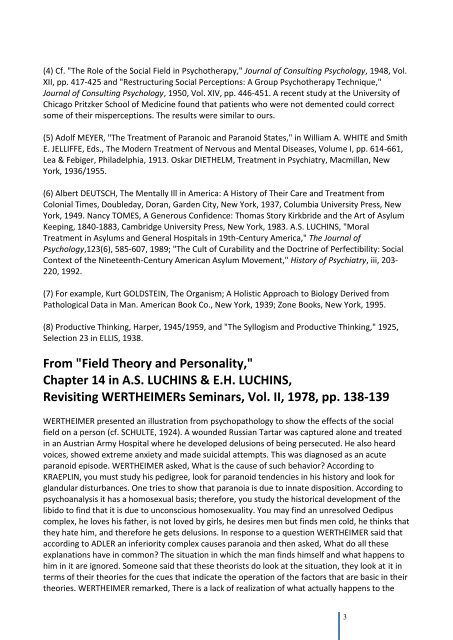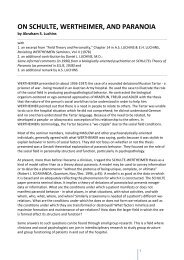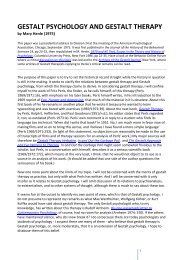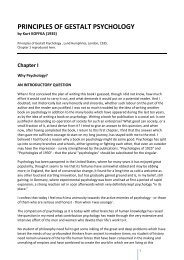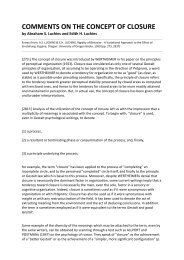pdf-Download - Society for Gestalt Theory and its Applications (GTA)
pdf-Download - Society for Gestalt Theory and its Applications (GTA)
pdf-Download - Society for Gestalt Theory and its Applications (GTA)
You also want an ePaper? Increase the reach of your titles
YUMPU automatically turns print PDFs into web optimized ePapers that Google loves.
(4) Cf. "The Role of the Social Field in Psychotherapy," Journal of Consulting Psychology, 1948, Vol.<br />
XII, pp. 417-425 <strong>and</strong> "Restructuring Social Perceptions: A Group Psychotherapy Technique,"<br />
Journal of Consulting Psychology, 1950, Vol. XIV, pp. 446-451. A recent study at the University of<br />
Chicago Pritzker School of Medicine found that patients who were not demented could correct<br />
some of their misperceptions. The results were similar to ours.<br />
(5) Adolf MEYER, "The Treatment of Paranoic <strong>and</strong> Paranoid States," in William A. WHITE <strong>and</strong> Smith<br />
E. JELLIFFE, Eds., The Modern Treatment of Nervous <strong>and</strong> Mental Diseases, Volume I, pp. 614-661,<br />
Lea & Febiger, Philadelphia, 1913. Oskar DIETHELM, Treatment in Psychiatry, Macmillan, New<br />
York, 1936/1955.<br />
(6) Albert DEUTSCH, The Mentally Ill in America: A History of Their Care <strong>and</strong> Treatment from<br />
Colonial Times, Doubleday, Doran, Garden City, New York, 1937, Columbia University Press, New<br />
York, 1949. Nancy TOMES, A Generous Confidence: Thomas Story Kirkbride <strong>and</strong> the Art of Asylum<br />
Keeping, 1840-1883, Cambridge University Press, New York, 1983. A.S. LUCHINS, "Moral<br />
Treatment in Asylums <strong>and</strong> General Hospitals in 19th-Century America," The Journal of<br />
Psychology,123(6), 585-607, 1989; "The Cult of Curability <strong>and</strong> the Doctrine of Perfectibility: Social<br />
Context of the Nineteenth-Century American Asylum Movement," History of Psychiatry, iii, 203-<br />
220, 1992.<br />
(7) For example, Kurt GOLDSTEIN, The Organism; A Holistic Approach to Biology Derived from<br />
Pathological Data in Man. American Book Co., New York, 1939; Zone Books, New York, 1995.<br />
(8) Productive Thinking, Harper, 1945/1959, <strong>and</strong> "The Syllogism <strong>and</strong> Productive Thinking," 1925,<br />
Selection 23 in ELLIS, 1938.<br />
From "Field <strong>Theory</strong> <strong>and</strong> Personality,"<br />
Chapter 14 in A.S. LUCHINS & E.H. LUCHINS,<br />
Revisiting WERTHEIMERs Seminars, Vol. II, 1978, pp. 138-139<br />
WERTHEIMER presented an illustration from psychopathology to show the effects of the social<br />
field on a person (cf. SCHULTE, 1924). A wounded Russian Tartar was captured alone <strong>and</strong> treated<br />
in an Austrian Army Hospital where he developed delusions of being persecuted. He also heard<br />
voices, showed extreme anxiety <strong>and</strong> made suicidal attempts. This was diagnosed as an acute<br />
paranoid episode. WERTHEIMER asked, What is the cause of such behavior? According to<br />
KRAEPLIN, you must study his pedigree, look <strong>for</strong> paranoid tendencies in his history <strong>and</strong> look <strong>for</strong><br />
gl<strong>and</strong>ular disturbances. One tries to show that paranoia is due to innate disposition. According to<br />
psychoanalysis it has a homosexual basis; there<strong>for</strong>e, you study the historical development of the<br />
libido to find that it is due to unconscious homosexuality. You may find an unresolved Oedipus<br />
complex, he loves his father, is not loved by girls, he desires men but finds men cold, he thinks that<br />
they hate him, <strong>and</strong> there<strong>for</strong>e he gets delusions. In response to a question WERTHEIMER said that<br />
according to ADLER an inferiority complex causes paranoia <strong>and</strong> then asked, What do all these<br />
explanations have in common? The situation in which the man finds himself <strong>and</strong> what happens to<br />
him in it are ignored. Someone said that these theorists do look at the situation, they look at it in<br />
terms of their theories <strong>for</strong> the cues that indicate the operation of the factors that are basic in their<br />
theories. WERTHEIMER remarked, There is a lack of realization of what actually happens to the<br />
3


